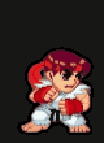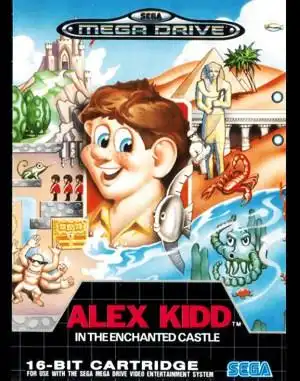For many Sega Genesis owners in the late '80s and early '90s, the console's library felt vast and full of wonders. Among the early titles, one particular game often stood out, not always for being a masterpiece, but certainly for its unique quirks: Alex Kidd in the Enchanted Castle. As the sole 16-bit entry in the Alex Kidd series and the fifth overall, it was Sega's attempt to bring their former mascot into the new generation, sending him on a bizarre quest across Planet Paperock.
Back to Paperock: The Story So Far
Picking up after the events of Alex Kidd in Miracle World, our hero Alex is living peacefully under his brother Egle's rule on Planet Aries. However, news arrives that Alex's long-lost father, King Thor, might still be alive and held captive on the distant Planet Paperock. Driven by filial duty (and maybe a touch of wanderlust), Alex embarks on a journey to find his dad, facing off against the villainous Janken the Great's son, High-Stones. It's a simple, classic setup for a platforming adventure, fueled by royal drama and inter-planetary travel.
Punching, Jumping, and Gambling: Gameplay Mechanics
At its core, Alex Kidd in the Enchanted Castle is a side-scrolling platformer. You guide Alex through eleven distinct stages, punching enemies, collecting coins (called Baums), and navigating tricky environmental hazards. Alex retains his signature punch, which is your primary means of attack, though it has a rather short reach.
What truly sets the game apart, and often frustrates players, is the reliance on rock-paper-scissors (Janken) matches. Instead of traditional boss battles, you often face opponents (including mini-bosses and the final confrontation) in a best-of-three Janken match. Winning earns you passage or items like a motorbike, pedicopter, or pogo stick, acquired by visiting gambling houses with your collected Baums. Losing, however, usually means instant death, sending you back to the start of the level or your last continue. This random element can be infuriating, as skillful platforming can be undone by a bad hand of Janken.
Adding to the challenge is the fact that Alex is a one-hit wonder. Any touch from an enemy or hazard results in losing a life, reinforcing the need for precise movement and careful planning – or just hoping the Janken gods are on your side.
Lost in Translation (or Censorship)?
A notable difference exists between the Japanese Mega Drive version and the Western Genesis release. In the Japanese version, losing a rock-paper-scissors match could result in the opponent briefly appearing nude. For the Western release, this was censored, replaced with the opponent being comically flattened or turning into something else. While a minor detail, it's a classic example of regional differences in retro gaming and a point of discussion among fans.
Critical Reception: A Mixed Bag
Upon its release, Alex Kidd in the Enchanted Castle garnered mixed reviews. Retrospectively, opinions have often leaned towards mixed-to-negative. Common criticisms include:
- Stiff Controls: Alex's movement can feel a bit floaty and his punch limited.
- Repetitive Gameplay: The core loop of platforming and mandatory, random Janken can wear thin.
- Frustrating Difficulty: The one-hit death combined with random boss outcomes can make progress feel unfair.
Despite the criticisms, the game holds a certain nostalgic charm for those who played it back in the day. It's undeniably a product of its time, showcasing Sega's early attempts on the 16-bit hardware and their commitment to their mascot before a certain hedgehog stole the spotlight.
Playing Today: Where to Find It
Though not as universally beloved as Sonic the Hedgehog, Alex Kidd in the Enchanted Castle remains an important piece of Sega history and is readily available for modern players. You can often find it included in:
- Various Sega Genesis / Mega Drive compilation titles released over the years on platforms like PC (often via GOG or Steam), PlayStation, Xbox, and Nintendo systems.
- The Sega Genesis Mini console.
- Digital storefronts and emulation platforms. Archive.org, for example, hosts browser-based versions of many classic games for historical preservation.
The Enchanted Castle's Legacy
Alex Kidd in the Enchanted Castle isn't Sega's finest hour, and it certainly highlights why Alex Kidd eventually faded into the background. Yet, it's more than just a footnote. It's a quirky, sometimes frustrating, but often fondly remembered platformer that many Genesis owners spent hours with. It represents a unique blend of classic platforming and bizarre mechanics, cementing its place as a charmingly flawed relic of the 16-bit era. If you're looking for a taste of early Genesis history, complete with questionable design choices and mandatory gambling, Planet Paperock is waiting.
FAQ
Q: Is Alex Kidd in the Enchanted Castle a difficult game? A: Yes, the game is often considered difficult due to the one-hit death mechanic and the random nature of the rock-paper-scissors boss battles.
Q: Why are there rock-paper-scissors matches? A: This was a signature mechanic of the Alex Kidd series, originating in Miracle World. It was intended as a unique way to handle boss encounters and gain items, though its randomness can be frustrating.
Q: Is this the last Alex Kidd game? A: No, while it was the last main platforming entry for many years, Alex Kidd has appeared in other games (like Sega Superstars Tennis) and received a modern remake of Miracle World in 2021.


